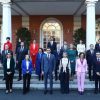By the London technology team
Cyber Dave discusses information security with Obama
The UK and US Governments are carrying out cyber war games, to test each other’s cyber capabilities and build up knowledge of threats online. The games were announced as an accompaniment to the high profile visit to the US by the Prime Minister. Setting up a UK-US ‘cyber-cell’ with the FBI, Mi5, GCHQ and NSA may sound good, but we’ll have to wait and see what formal arrangements happen and how much of this is electioneering.
The Government has, however, taken cyber security seriously during this parliament. The National Cyber Security Strategy has a budget of £860m until 2016 and a number of programmes are underway. Cameron also used the visit and the aftermath of the Paris attacks to publicise his expectation that US tech companies do more to help track terrorist content. This will be hard, as US companies don’t tend to like being told to act as police, and there are serious concerns about introducing mass surveillance.
The story was widely reported, but Doug Drinkwater gives a good report for SC Magazine.
.
From hi-tech to tech neck
This week saw the publication of two interesting studies on device and internet usage. The first finds that constant bending of the neck to look at screens is leading to a condition nicknamed ‘tech-neck’ and is, in dermatologist’s opinions, ultimately driving premature ageing. The condition is found mostly in people aged 18 to 39 who have an average of three digital devices and peer at their screens up to 150 times a day. Yves Saint Laurent claims to have even invented the first cream to tackle ‘tech-neck’. You can find an excellent summary of the phenomenon of tech-neck by The Telegraph.
Meanwhile, in the US, a Pew Research Center survey of 1,801 adults found that frequent internet and social media users do not have higher levels of stress but that the use of digital technology increases awareness of stressful events in others’ lives and is a contributor to people’s own stress. It will be interesting to see whether an entirely new market and products, such as Yves Saint Laurent’s, develop to combat the adverse impact of device and internet over usage.
.
#GE2015 & the growing tech-electorate
Research by Fujitsu suggests that 1 in 5 Brits would vote for a party at #GE2015 if it focused on digital policies. The study (reported by Information Age this week) shows that almost two-thirds of Brits are comfortable with digital services and only 15% feel that digital services are too complicated to use. Furthermore, only 26% felt that enough was being done across the UK to educate citizens on digital services, while 54% said they would like to see the government do more to prepare the nation for a digital future.
In @BenRossi89’s article for Information Age, Michael Keegan (CEO UK and Ireland, Fujitsu) commented, “We are now more confident in our ability to use the services offered, we understand the benefits and as such, it is consumers themselves pushing organisations to create a digital future.”
Tech has certainly charted a dramatic rise up the political agenda in recent years and on this evidence it is also taking a more central position at the front of voter’s minds. In the run up to #GE2015 let’s hope we see some digital policies of the scale and ambition desired by an increasingly tech-savvy electorate.





